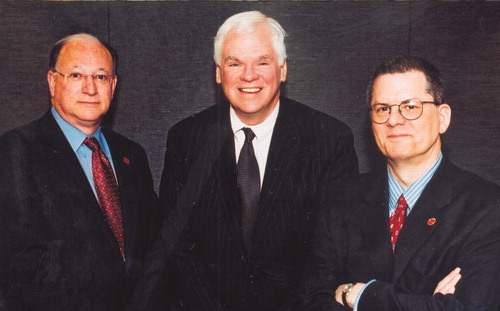New APA Division Will Sharpen Advocacy Focus
APA has merged three of its departments into the new Division of Advocacy in a reorganization it hopes will enhance collaboration and maximize the effectiveness of its key initiatives in the public arena.
On March 1, the Department of Government Relations (DGR), Office of Healthcare Systems and Financing (OHSF), and Office of Communications became part of the new division.
 APA Medical Director James H. Scully Jr., M.D., appointed Eugene Cassel, J.D., director of the Division of Advocacy. Cassel, who joined DGR’s staff in 1986, has been DGR’s acting director for the last 14 months, following the retirement of Jay Cutler.
APA Medical Director James H. Scully Jr., M.D., appointed Eugene Cassel, J.D., director of the Division of Advocacy. Cassel, who joined DGR’s staff in 1986, has been DGR’s acting director for the last 14 months, following the retirement of Jay Cutler.
Scully also promoted DGR’s deputy director, Nicholas Meyers, to the DGR director’s post. Meyers, a member of the DGR staff since 1990, had been the department’s deputy director for federal relations.
The OHSF is headed by Sam Muzynski, J.D., and Amy Levey is acting director of the Office of Communications.
Explaining his decision to merge the three departments into the new division, Scully said, “I believe the profession of psychiatry and our patients will be well served by our strategic move to increase coordination between these important work areas and amplify APA’s message.”
He added that the new division will ensure that APA’s initiatives in the legislative and regulatory realms on issues related to the economics of psychiatric practice and its outreach to businesses are synchronized and publicized in a coordinated fashion.
Cassel and Meyers, he noted, “bring a wealth of organizational and advocacy experience to their new roles and are uniquely prepared to have an immediate and significant impact on our advocacy efforts, which our members routinely identify as their top priority.”
Cassel said he plans to “integrate and sharpen the focus” of the three offices primarily “through information sharing and coordination. For example,” he explained, “when DGR or OHSF is facilitating APA testimony or other interactions with the government, the communications office will make sure that the world knows about it. In that way, the communications office will amplify and maximize the advocacy team’s efforts.”
He emphasized that “the policy agendas of the organization will remain the same as they are, but the way we will go about achieving them is what will be different in the future. . . . Our success will show in the outcomes—how well psychiatry and patients are faring and the level of member satisfaction with APA.”
Meyers pointed out that DGR’s priorities remain the securing of final passage of the Mental Health Equitable Treatment Act now awaiting Senate consideration, urging increased support for federal research funding, overhauling Medicare’s “antiquated coverage” of and copayments for psychiatric services, preserving patients’ access to medications and psychiatric services under Medicaid, and “addressing troubling challenges to the privacy of patient psychiatric and other medical records.”
“My goal,” Meyers added, “is to identify areas in which DGR can become even more proactive in its support of member interests.” ▪



